
Wutopia Lab设计的朵云书院黄岩店,于2021年6月26日正式落成并盛大开幕。这是诞生于上海的朵云书院的外省市首店。可谓一朵象征理想主义的云,缓缓升起在永宁江畔。
Wutopia Lab designed the Huangyan store of Duoyun Bookstore, which was officially completed and grandly opened on June 26, 2021. This is the first store in a foreign province for Duoyun Bookstore, which was born in Shanghai. It can be described as a cloud symbolizing idealism that slowly rises on the bank of Yongning River.
▼项目视频 Video @CreatAR Images
起兴
设计的开始完全可以基于一种情绪。白天站在永宁江边,江水平静地缓缓东去,我很容易被带入中国南派山水的平远式构图之中,心情和视线都沿着水平线延伸而放松。晚上,江边许多人各自扎堆娱乐,热闹欢快而不嘈杂。空气中略微有些潮湿,江风轻轻弹破水珠,在我的脸庞周围爆裂出一点一点的清爽。我很羡慕这个城市的安详和愉悦,这是上海所稀缺的。突然,我认定应该有一朵云,平静地缓缓在江边升起。
Getting up
The beginning of a design can be based on a mood. Standing by the Yongning River during the day, with the river calmly and slowly going east, I was easily brought into the flat and distant composition of the southern Chinese landscape, and my mood and sight were both relaxed along the horizontal line. In the evening, many people pile up for their own entertainment along the river, lively and cheerful but not noisy. The air was slightly humid, and the river breeze gently popped through the water droplets, bursting a little refreshment around my face. I envied the tranquility and pleasantness of this city, which is scarce in Shanghai. Suddenly, I decided there should be a cloud, calmly and slowly rising over the river.

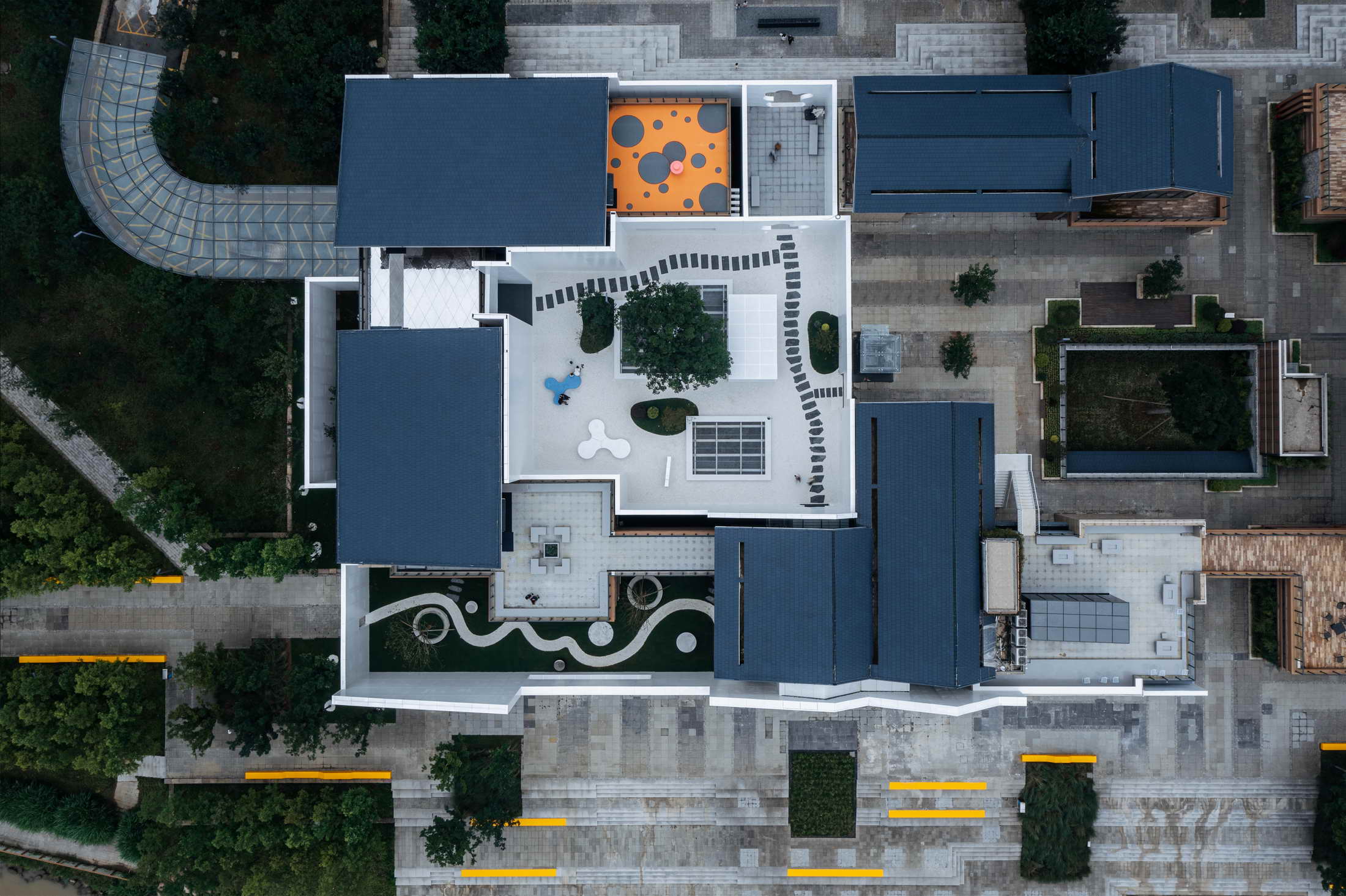
作为加法的减法
云具有一种复杂的纯粹美感。我不对拼贴的杂乱的商业地域性立面做整容手术,而决定连续的白色穿孔铝板墙将其包裹起来。连续的白色在江畔形成了一个复杂而纯粹的界面(通过控制穿孔率,立面上会形成云雾缭绕的层次)把书店藏起来了。铝墙是立面,也可以剥离立面成为庭院的围墙或者两者兼顾。连续的白色铝墙是用做加法的方式创造了一个宁静而宜人的视觉减法。一朵云升起在江畔,书店的读者就在云中了。
Subtraction as Addition
Clouds have a sophisticated and pure beauty. Rather than perform cosmetic surgery on a collage of cluttered commercial territorial façades, I decided to wrap them in a continuous white perforated aluminum panel wall. The continuous white creates a complex and pure interface on the riverside (by controlling the perforation rate, the façade creates a cloud of layers) hiding the bookstore. The aluminum wall is the façade, or it can be stripped away to become a courtyard enclosure or both. The continuous white aluminum wall is used as an addition to create a serene and pleasant visual subtraction. A cloud rises over the riverside, and the readers of the bookstore are in the cloud.


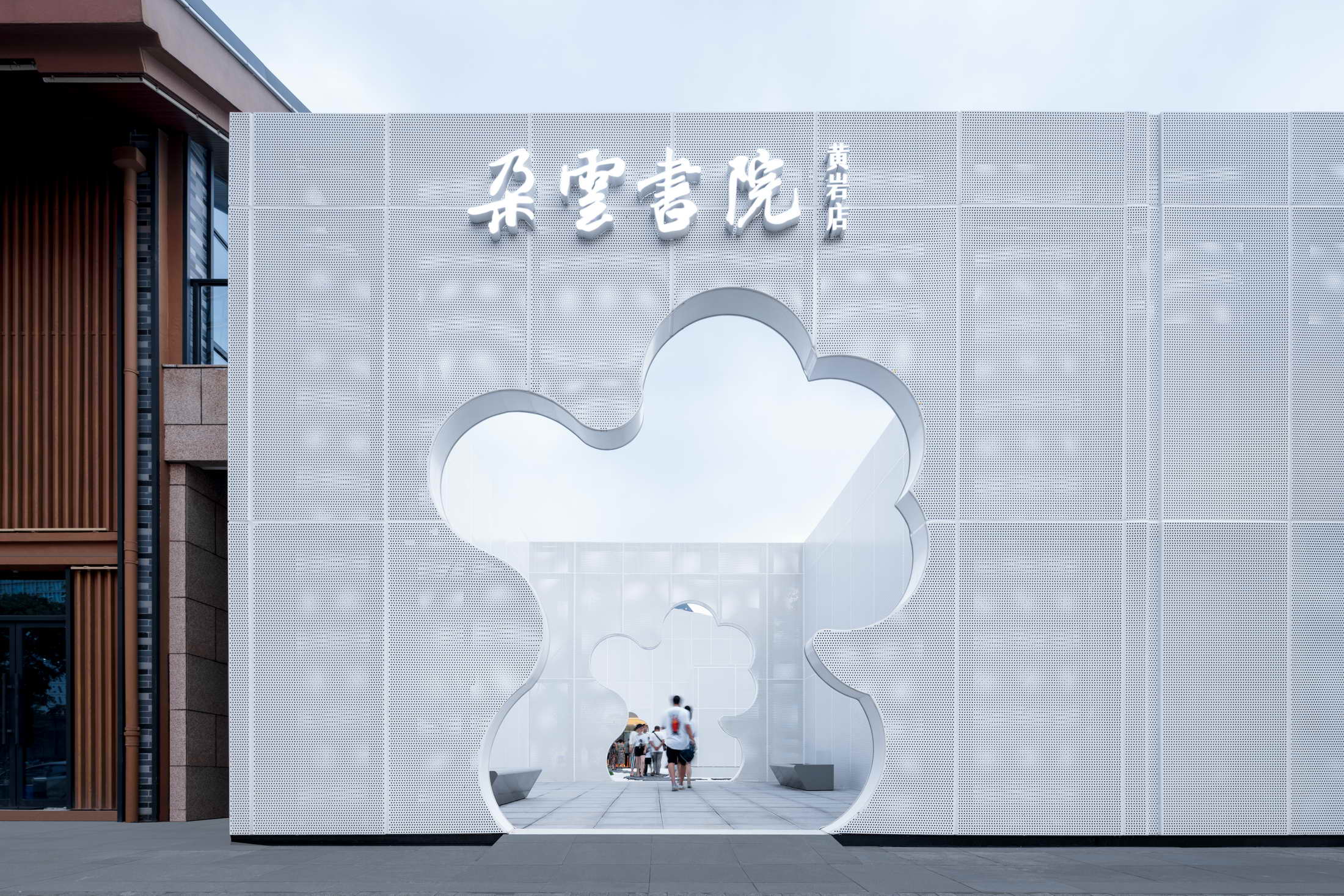
传统类型学
书院选址在永宁江边上一组4栋建筑中的1,3号楼。1号楼也是由两栋建筑在首层相连成一体的。公共空间场地设有地下室天井和疏散楼梯间。是一个焦点分散而没有重点的场所。传统有规模和形制的书院都是一组有序的建筑群形成的。我如果把分散的1,3号楼以及内部空间看成传统建筑群里的亭台楼阁和庭堂轩榭的类型,那么显而易见这样的建筑群缺一个作为重点的院子。既然我需要一个空间来控制这些分散的个体,那么创造一个庭院类型毫无疑问是我的自然而然对的选择。
Traditional typology
The site of the academy is located in buildings 1 and 3 of a group of four buildings on the edge of the Yongning River. building 1 is also composed of two buildings connected on the first floor as one. The public space site has a basement patio and an evacuation stairwell. It is a place where the focal points are scattered and unfocused. Traditionally, the "shuyuan" with scale and form are formed by a group of ordered buildings. If I consider the scattered buildings 1 and 3 and the interior space as the type of pavilions and pavilions in a traditional building group, then it is obvious that such a building group lacks a courtyard as a focal point. Since I needed a space to control these scattered individuals, creating a courtyard type was a natural choice for me.
▼轴侧图 Axonometric
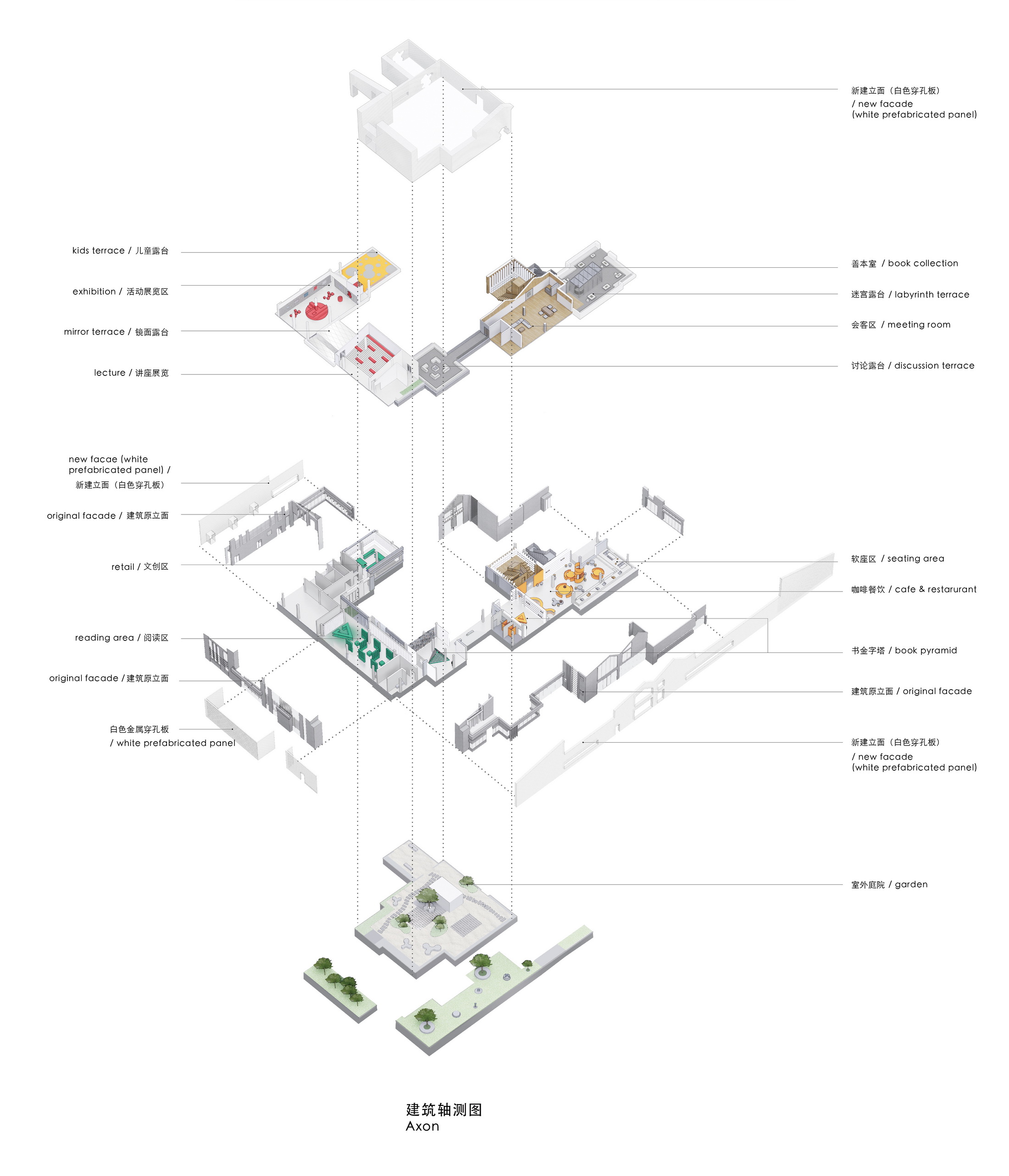
1,3号楼之间的空地被我规划出一个方形的院子。但这个院子躲在1,2号楼(他人物业)之间的夹弄后面。一不做二不休,我把这个夹弄变成了前院。成为书院的正式入口。
I planned a square yard in the open space between buildings 1 and 3. However, this yard was hidden behind the fence between buildings 1 and 2 (other people's properties). I turned this courtyard into a front yard. It became the official entrance of the bookstore.
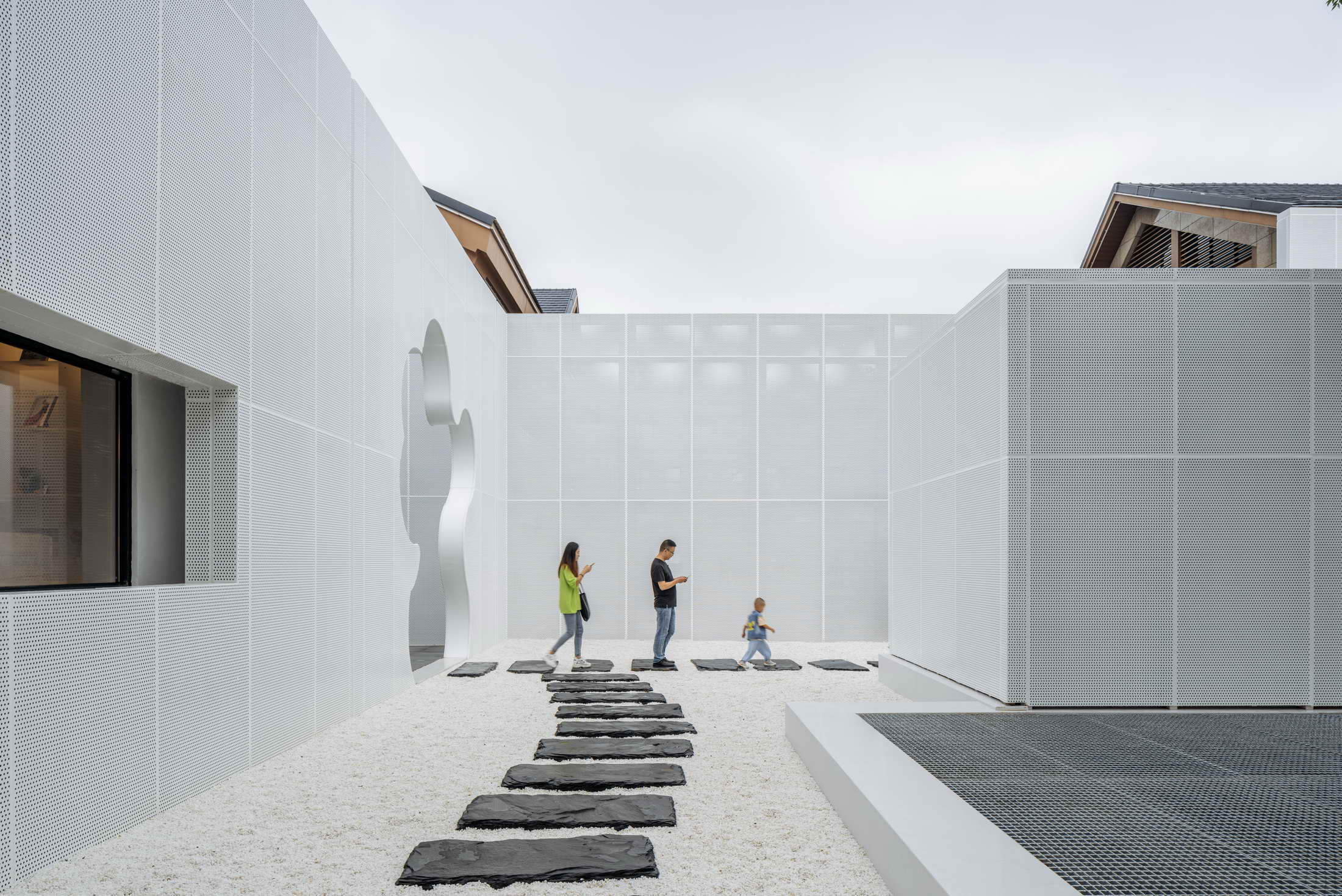

穿过层层门洞来到作为建筑主入口的3号楼,第一个区域是生活方式类图书区(厅),东侧是临水的咖啡区(榭)。我把咖啡到二楼的楼梯设计成结合交通的善本复制品展示区(阁)。咖啡二楼则是未来的城市客堂间(楼)。
The first area is the lifestyle book (area), and the coffee (pavilion) on the east side is near the water. I designed the staircase from the coffee to the second floor as a display (terrace) for reproductions of rare books combined with traffic. The second floor of the coffee is then the future urban parlor room (building).

西侧加设了室内过道通往1号楼。这个过道被设计成展廊(廊)。1号楼首层是书店区域,入口是朵云特有的有态度的书架区(亭),转过向北进入书店主陈列区(堂)。经过收银台进入利用过道设计的阅读区(居),其后就是文创区(斋)。
An interior aisle has been added on the west side to Building 1. The first floor of Building 1 is the bookstore area, with the entrance being the unique Doyun shelving area (kiosk) with attitude, and then turning north into the main bookstore display (hall). After passing through the cashier's desk, you will enter the reading (dwelling) designed using the aisle, followed by the creative (house).
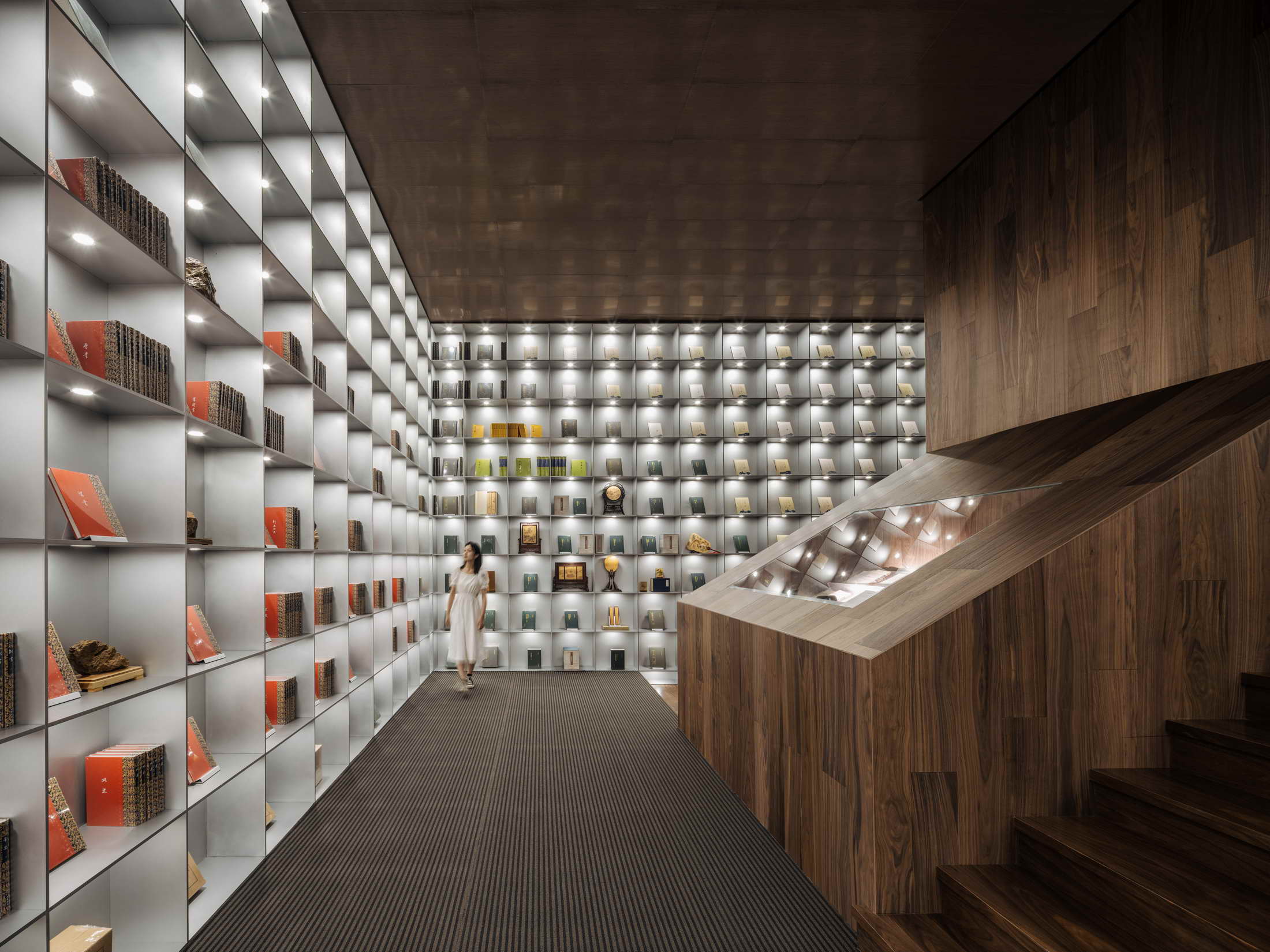
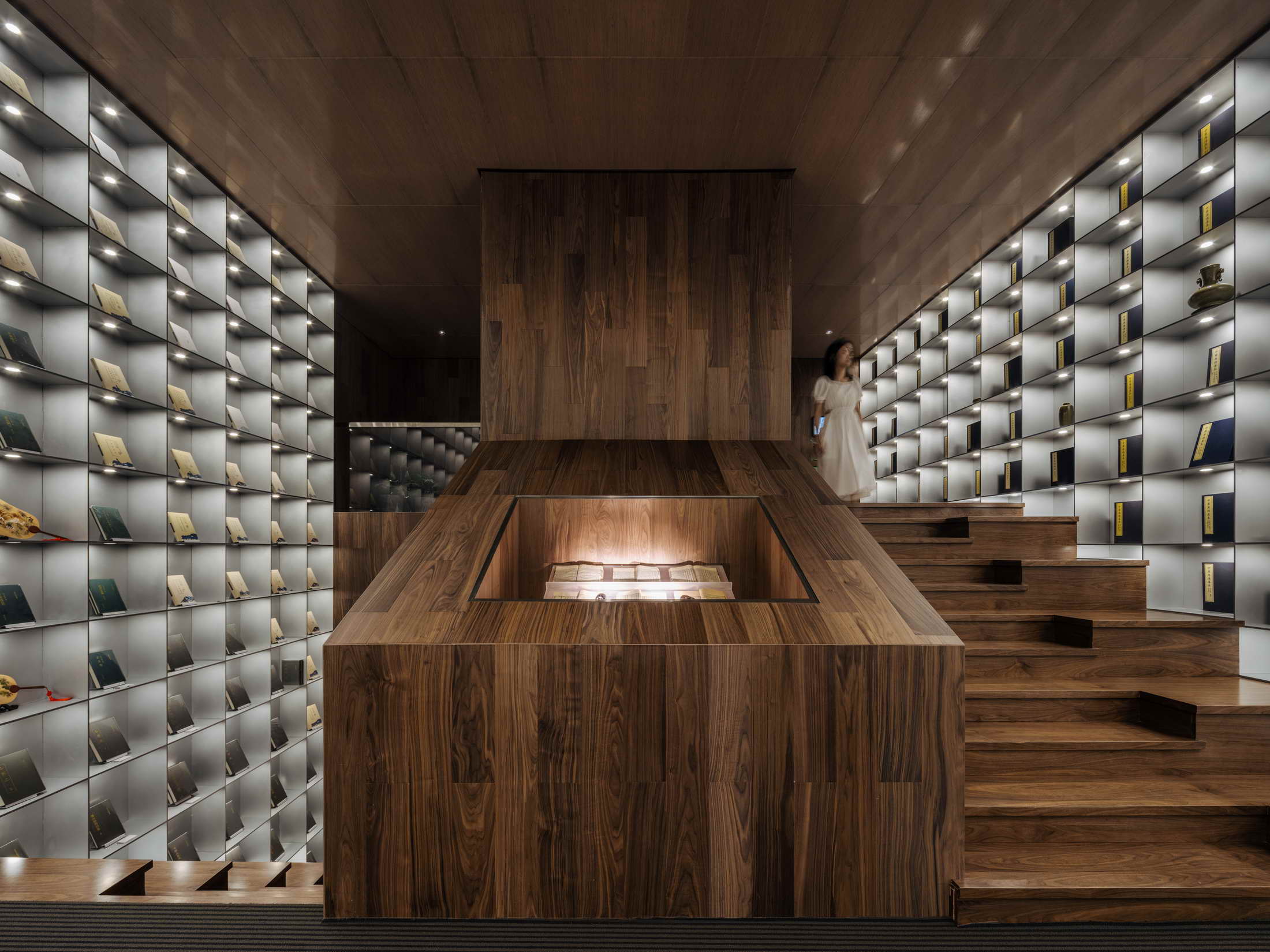

文创区的楼上是展览(馆)。书店的楼上是个阶梯演讲区域(室)。二楼之间都是屋顶平台相连。这些(台)是儿童嬉戏平台,镜面露台,有火塘的讨论露台和作为咖啡外摆的迷宫露台。
The upstairs of the cultural and creative area is an exhibition (museum). The upstairs of the bookstore is a stepped lecture area (room). The second floors are all connected to each other by roof terraces. These (platforms) are a children's play platform, a mirror terrace, a discussion terrace with a fire pit and a labyrinth terrace as a coffee outing.
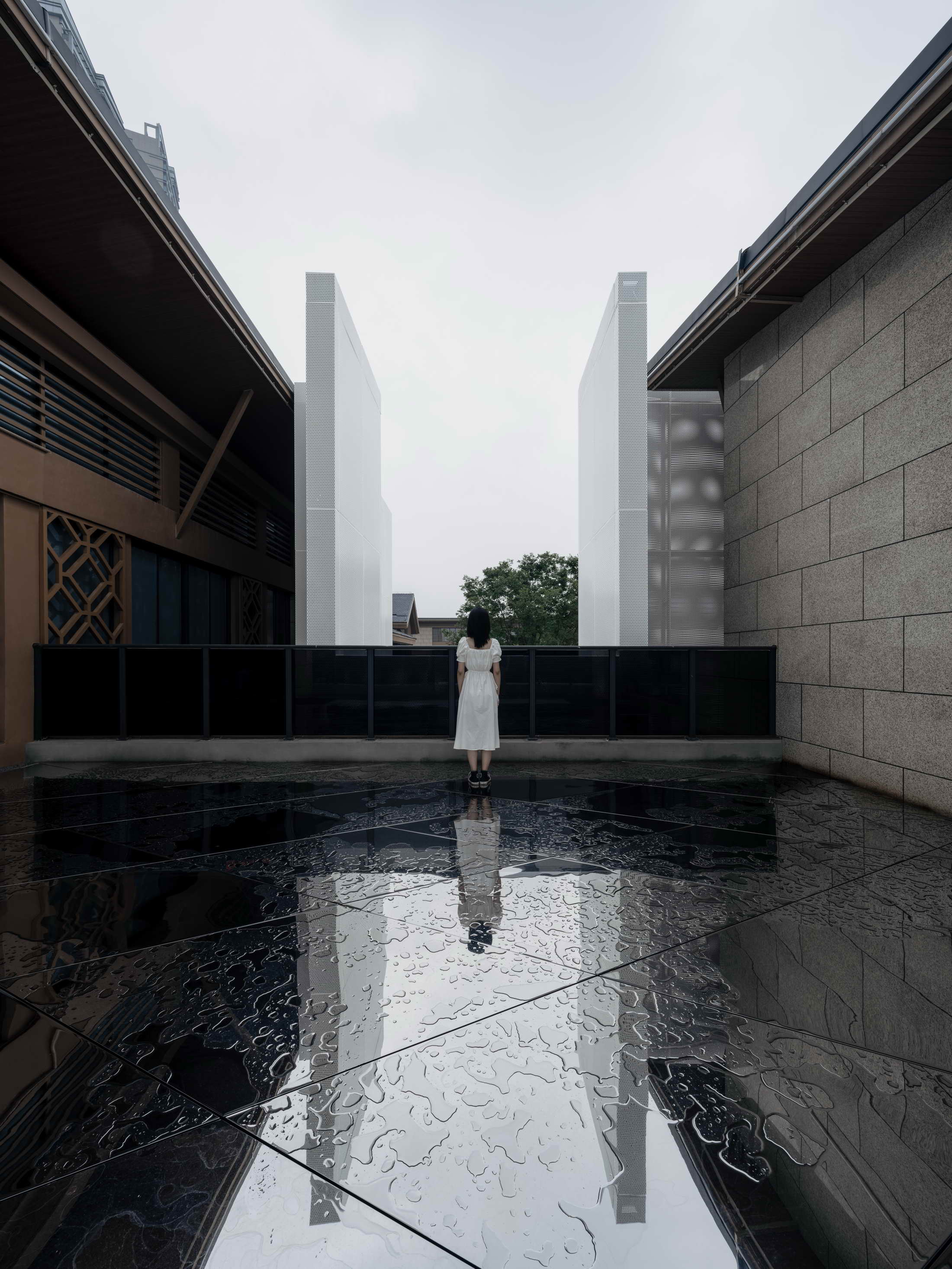
拿亭台楼阁和庭堂轩榭的类型建筑学借用的好处是,将功能和园林的建筑类型联系起来便于让不懂建筑的观众更容易理解并支持我用新庭院来改建公共空间将建筑群整合成容易解读的新书院。那个后来被命名白云庭的院子以及衍生的三个边庭(前院,南苑和西庭)和围墙,将1,3号楼整合成一个在视觉上连续的建筑群。于是一个新书院建筑空间脱胎于历史建筑类型而改写了一组分散的商业建筑,最后创造一个新的视觉和空间形象。
The advantage of borrowing the typological architecture of pavilions and courtyards is that the connection between the function and the architectural type of the garden makes it easier for an uneducated audience to understand and support my use of the new courtyard to transform the public space and integrate the buildings into an easily interpretable new courtyard. The courtyard, later named Baiyunting, and its three side gardens (the front garden, the south garden, and the west garden) and the wall, integrate buildings 1 and 3 into a visually continuous complex. Thus a new courtyard architectural space is born out of the historical building type and rewrites a group of scattered commercial buildings, finally creating a new visual and spatial image.
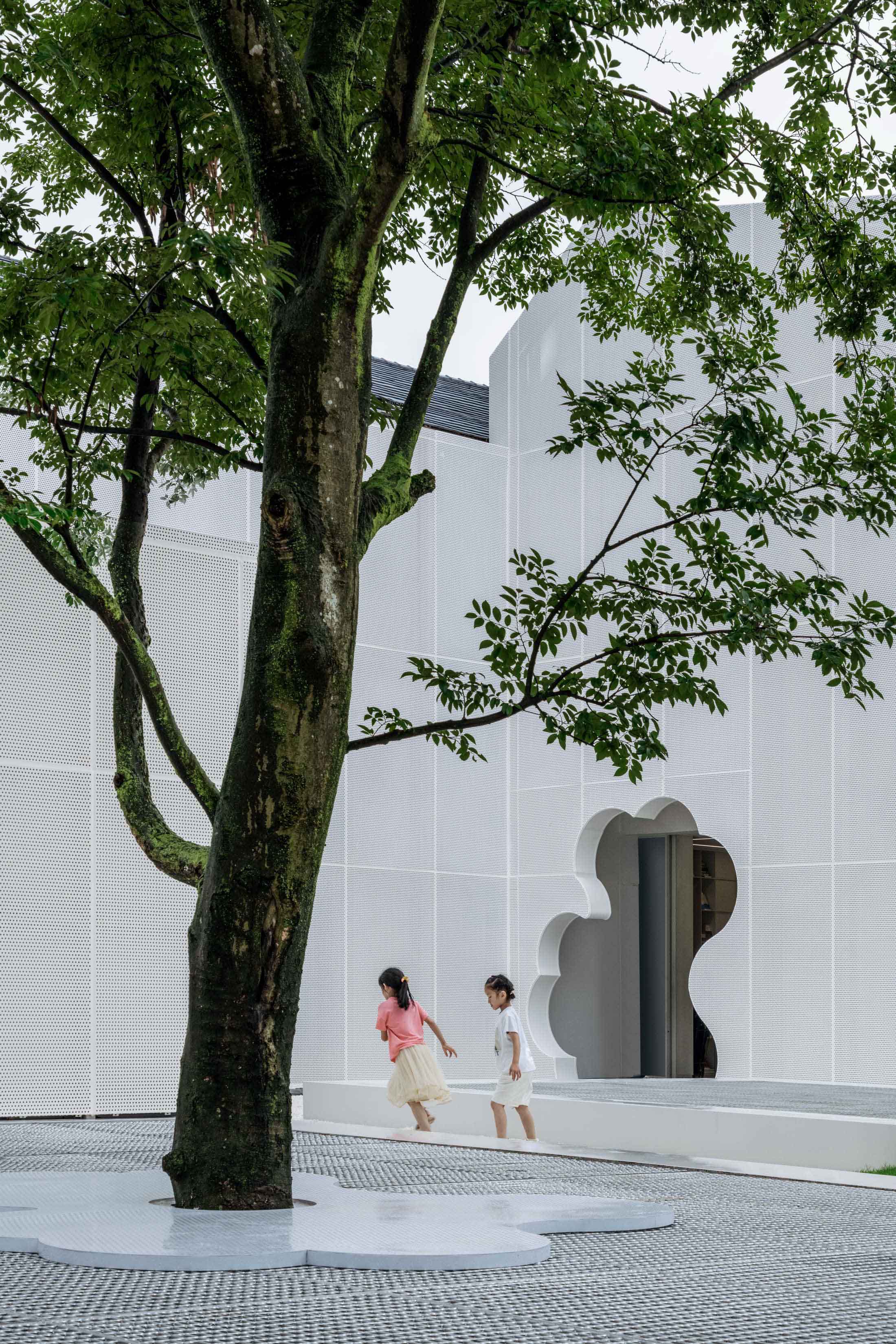
隐喻和符号之五彩祥云
我坚持建筑应该是充满隐喻的。我们把云提炼成一个容易阅读的形式符号,将其变成门洞,标识甚至VI。白云的白则覆盖了所有的建筑背景空间来强化云中的象征意义也代表了朵云的上海。从黄岩最著名的橘子提炼的桔色不仅代表了朵云的黄岩,更成为入口图书区和咖啡区的前景主色。由白云到橘云,很容易构建一个关于五色祥云的故事。由此书店区包括文创区前景采用了绿色。这也是朵云书院系列中的经典色,更重要的是作为青色的蓝在台州当地有特殊的意义,并不能作为主色使用,所以选了朵云书院家具系列中的经典绿色作为青云。二楼的演讲区选了绯红色作为红云,二楼的展览区选了粉紫色作为紫云。五种不同的颜色标识了不同的主要功能区。这是云这个隐喻的进一步演绎。五色祥云的故事最后取代了类型学建筑借用成为联系功能,上海,黄岩,典故,文献,历史和地方性的突出陈述。强化了作为隐喻的云的丰富性以及符号使用的正当性。从而建立一个在云中读书的“神话”。
Metaphors and Symbols of Colorful Clouds
I insist that architecture should be full of metaphors. We distilled the clouds into an easy-to-read formal symbol, turning them into doorways, logos and even UIs, while the white of the clouds covers all the background spaces of the building to reinforce the symbolic meaning in the clouds and represent the Shanghai of the clouds. The orange color extracted from Huangyan's most famous orange not only represents the Huangyan of Duoyun, but also becomes the main color in the foreground of the entrance book and coffee area. From white clouds to orange clouds, it is easy to build a story about five-color auspicious clouds. The bookstore area thus includes the green color in the foreground of the cultural and creative area. This is also the classic color in the Duoyun Bookstore series. More importantly, the blue as cyan has a special meaning in the local Taizhou area and cannot be used as the main color, so the classic green in the Duoyun Bookstore furniture series was chosen as the cyan cloud. Crimson was chosen as the red cloud for the speech area on the second floor, and pink and purple was chosen as the purple cloud for the exhibition area on the second floor. The five different colors identify the different main functional areas. This is a further interpretation of the metaphor of clouds. The story of the five colored clouds finally replaces the typological architectural borrowing as a prominent statement linking function, Shanghai, Huangyan, allusion, documentation, history and locality. The richness of the clouds as a metaphor and the legitimacy of the symbolic use are reinforced. Thus, a "myth" of reading in the clouds is established.
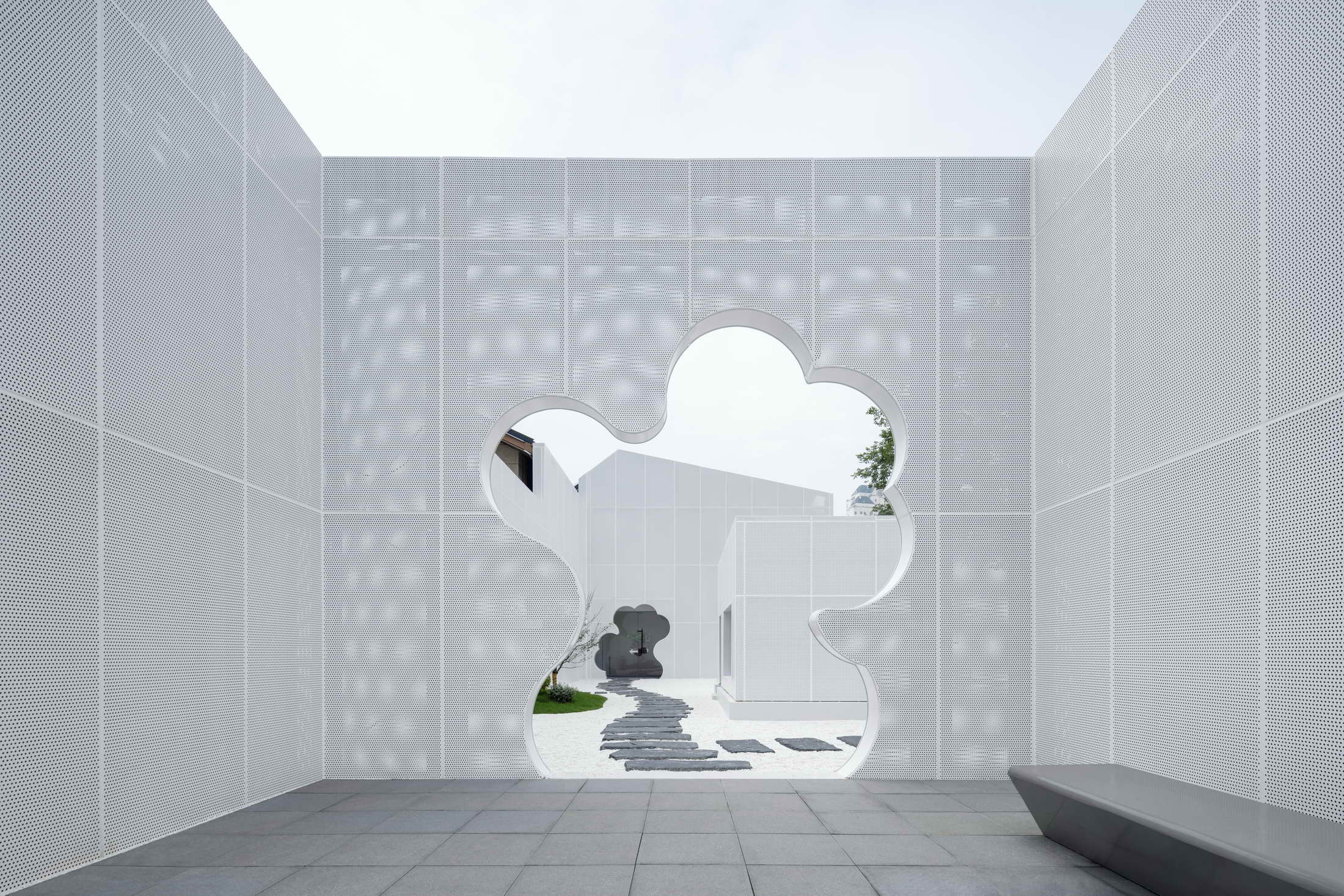
金字塔和迷宫
在讨论空间视觉焦点这个话题时,项目建筑师提供的艺术家Roelof Louw于1967年创作的Pyramid of Oranges的照片成为灵感。在门厅制作了一个橘色摆放书籍的金字塔书台。(这个Pyramid其实更像Ziggurat.不过中文都是一样的)。它成为空间的主导装置, 一个更大的绿色的金字塔书台成为有态度书架区(亭)的中心。而脱胎于金字塔的三角形变成半透明的亚克力收银台成为书店主区(堂)的控制性视觉焦点。橘色和黄岩的关系在某种意义上更符合艺术家当年装置的正式名称Soul of City。在朵云书店黄岩店则由此创造了是Soul of Huangyan。
Pyramids and Labyrinths
In discussing the topic of the visual focus of the space, a photograph of the Pyramid of Oranges, created by artist Roelof Louw in 1967, provided by the project architect, served as inspiration. An orange pyramid book table with books was created in the foyer. (The Pyramid is actually more like a Ziggurat, but the Chinese is the same). It becomes the dominant device in the space, and a larger green pyramid book table becomes the centerpiece of the shelf area (kiosk) with attitude. And the triangle stripped from the pyramid becomes a translucent acrylic cashier's desk that becomes the controlling visual focal point of the main bookstore area (hall). The relationship between the color orange and Huangyan is in a sense more in line with the official name of the artist's installation, Soul of City, which was created in the Duoyun Bookstore Huangyan store.
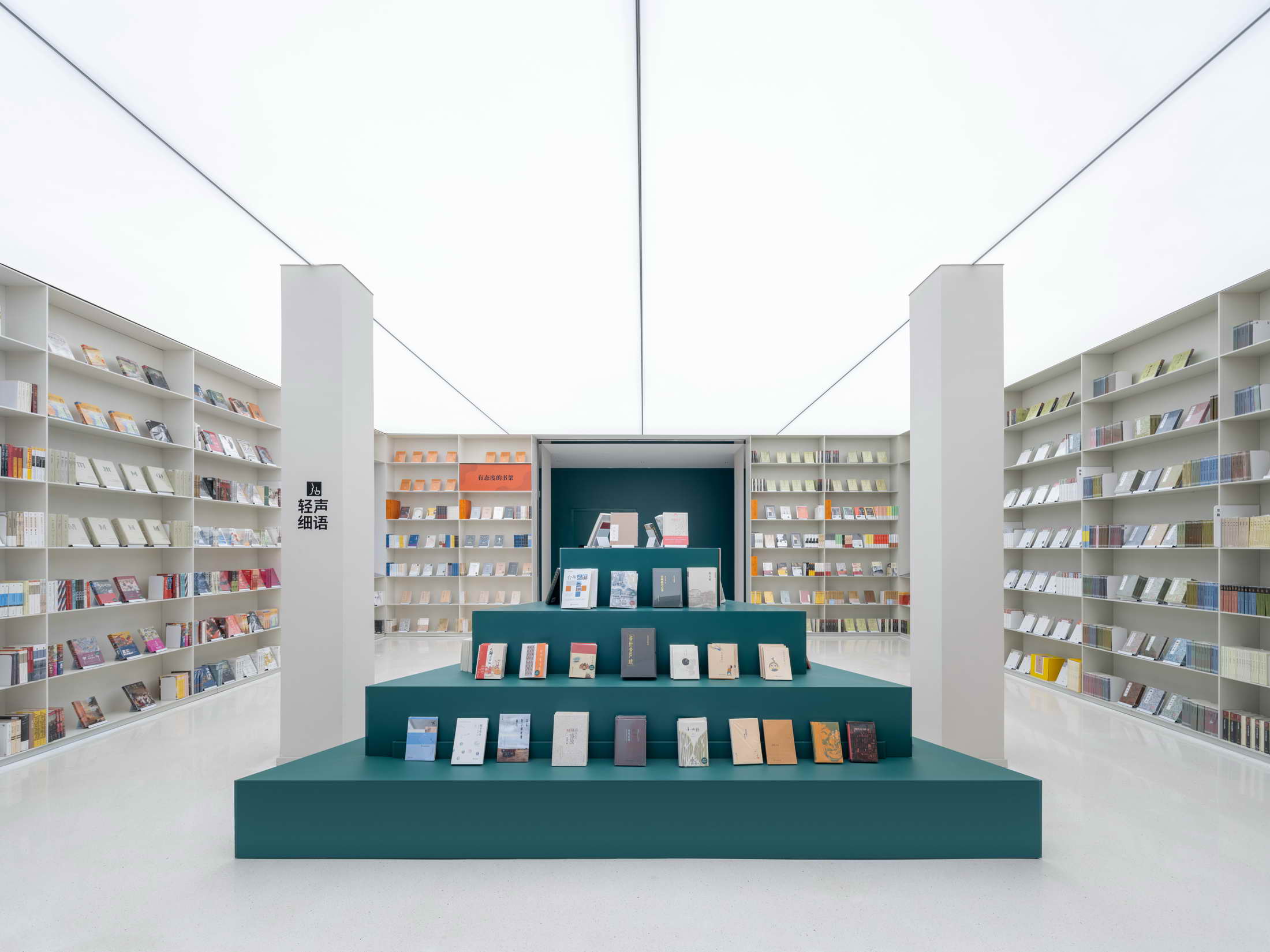
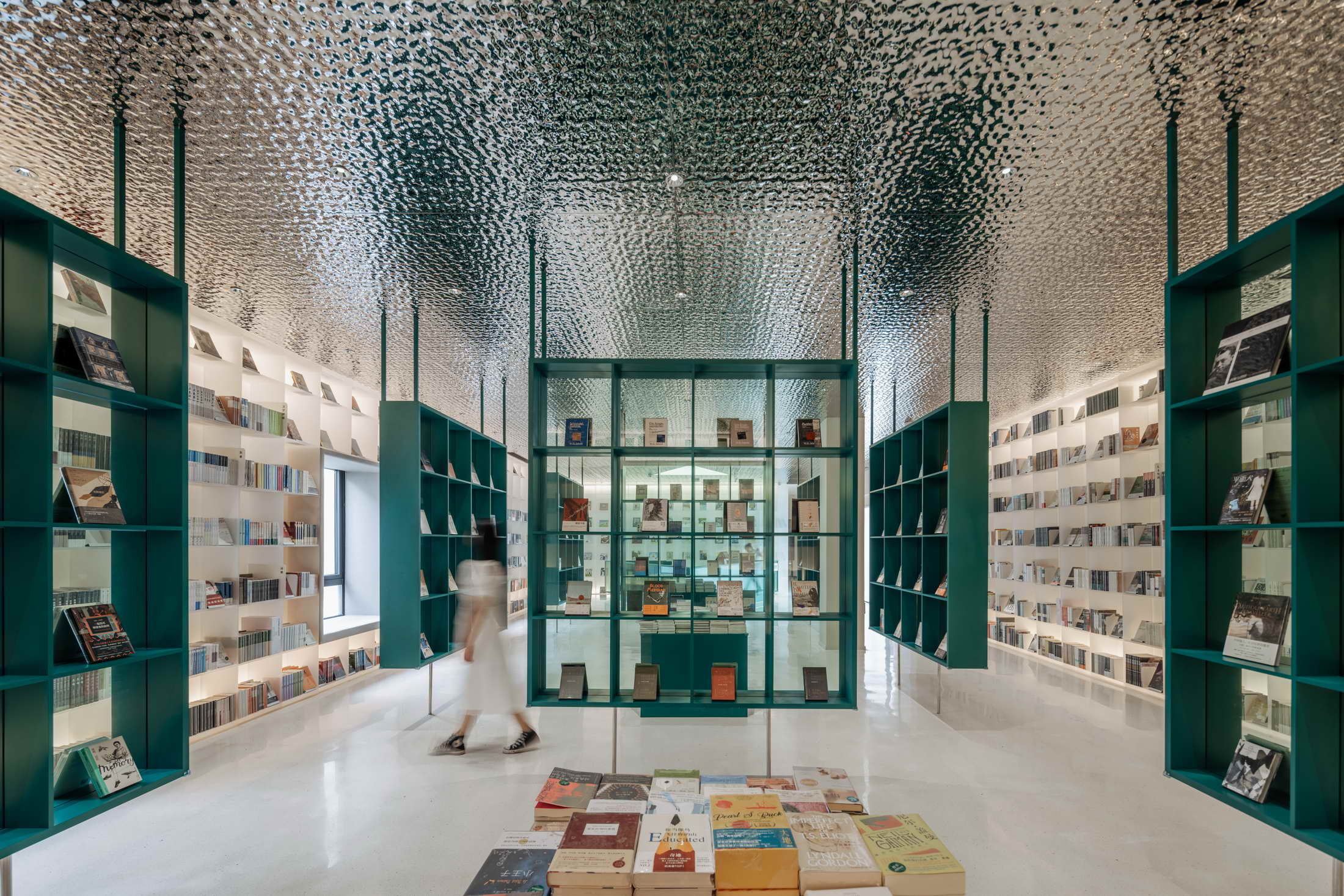
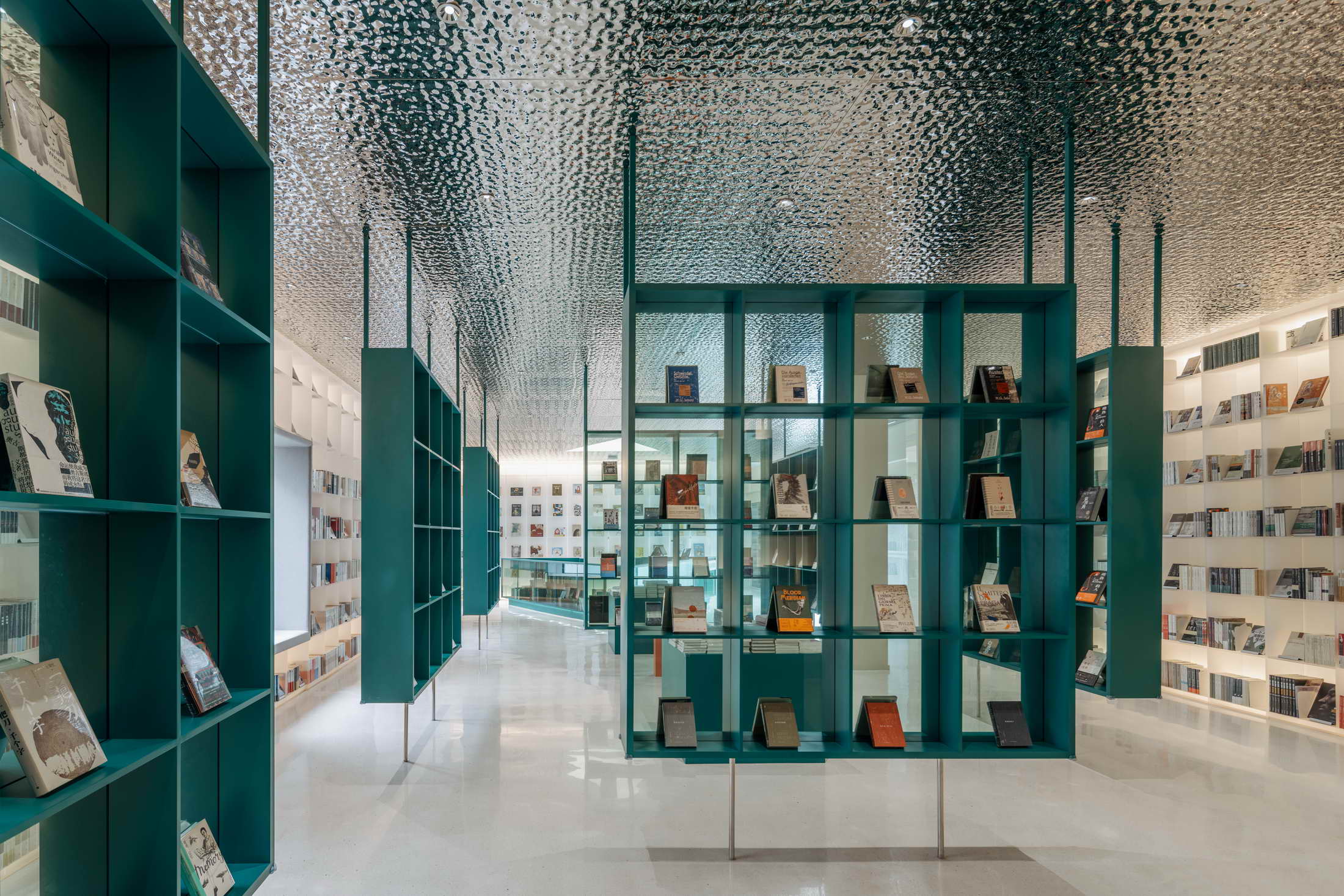

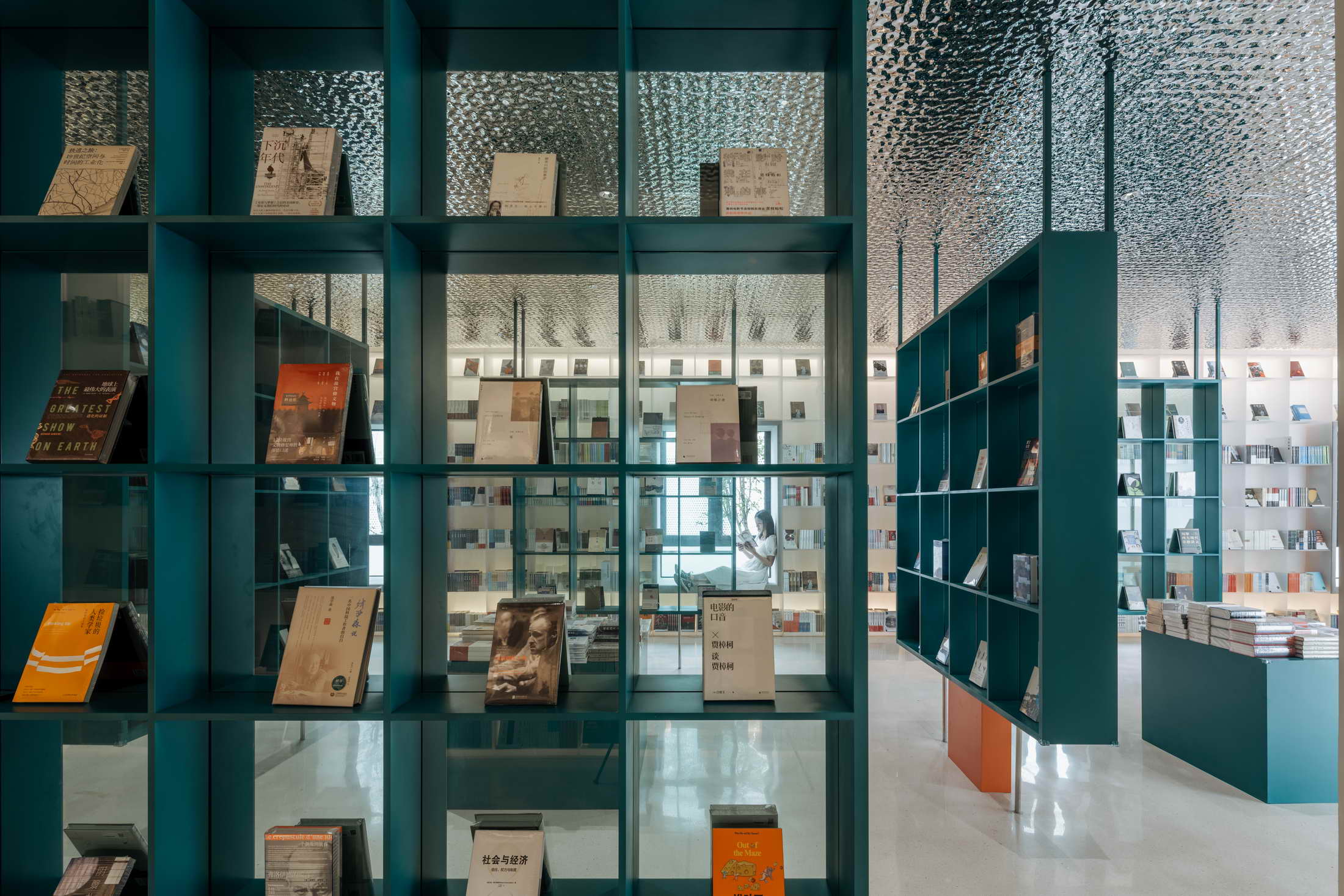
我一直着迷在场所中通过方向和视觉的复杂组织来创造时间体验,相对的快与慢。迷宫是一个极好的建筑类型结合光线能够达成这种体验。于是书架和家具成为书店迷宫的墙。透明和半透明的界面模糊了光线的明确性,让人在空间中产生迷惑和充满好奇的不确定。以至于时间在这里似乎有些慢。意外的是在咖啡区(榭),橘色的家具更像涟漪。而在临窗的高台上沙发上发呆,江水水平如画卷展开,一种中国画形成的时间观意外的复生了,吻合了我第一次站在江边时的那个情绪。由于屋面板下多余的结构次梁,我无法在收银台天花上开设天光,让水面和天空成一色。只能以发光天棚代替,少了一种光线组合,略微有些遗憾。
I have always been fascinated by the complex organization of direction and vision in places to create the experience of time, relative fast and slow. A labyrinth is an excellent architectural type combined with light to achieve this experience. So the bookshelves and furniture become the walls of the bookstore maze. Transparent and translucent interfaces blur the clarity of light, creating a disorienting and curious uncertainty in the space. So much so that time seems to slow down a bit here. Unexpectedly in the coffee area (pavilions), the orange-colored furniture is more like ripples. And when I laze on the sofa on the raised platform near the window, the river level unfolds like a scroll, a kind of time view formed by Chinese painting unexpectedly comes back to life, matching that emotion I felt when I stood by the river for the first time.Due to the extra structural secondary beams under the roof panels, I could not open the sky light on the cashier ceiling to make the water and sky into one color. I could only replace it with a luminous canopy, which is slightly regrettable as there is one less light combination.
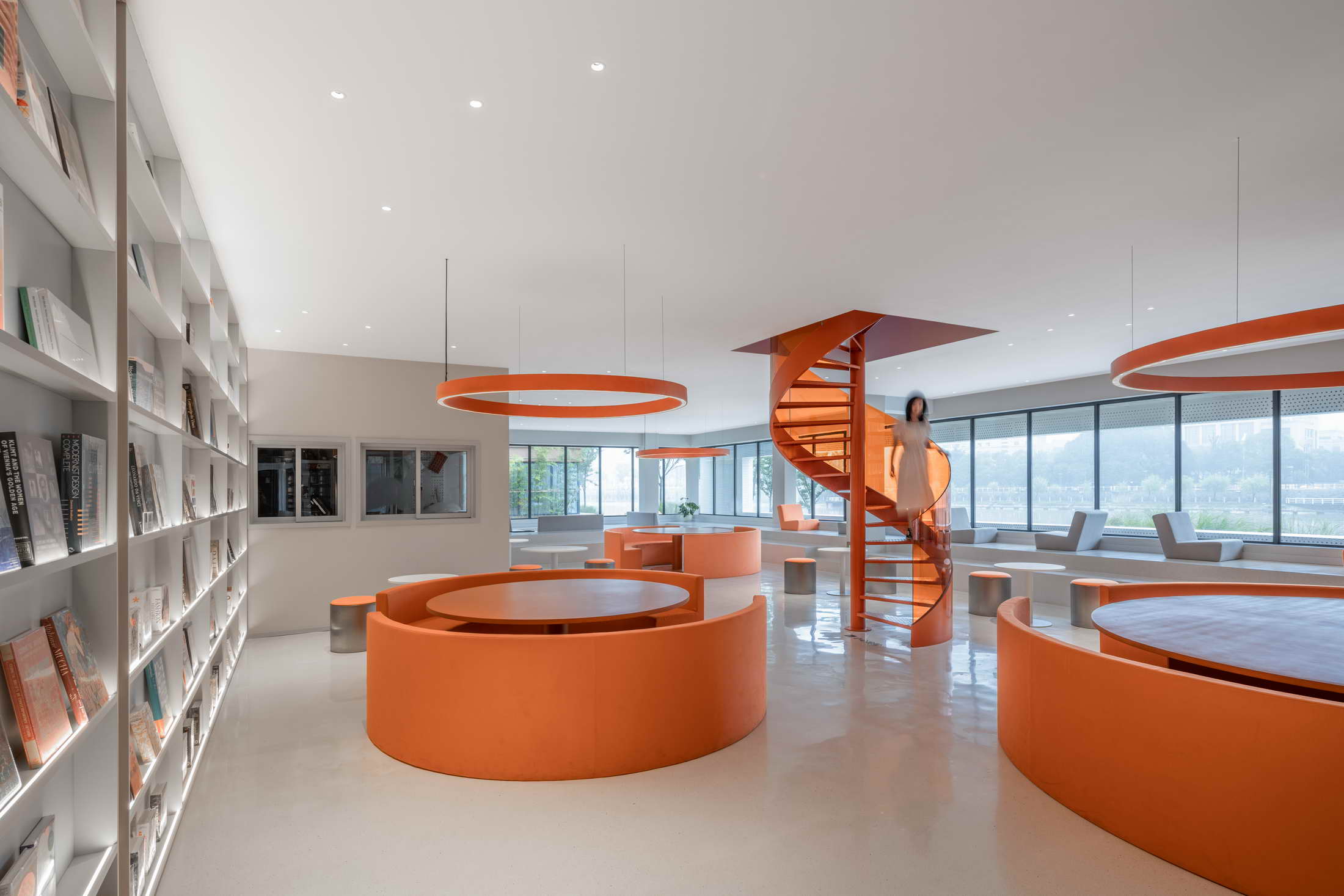
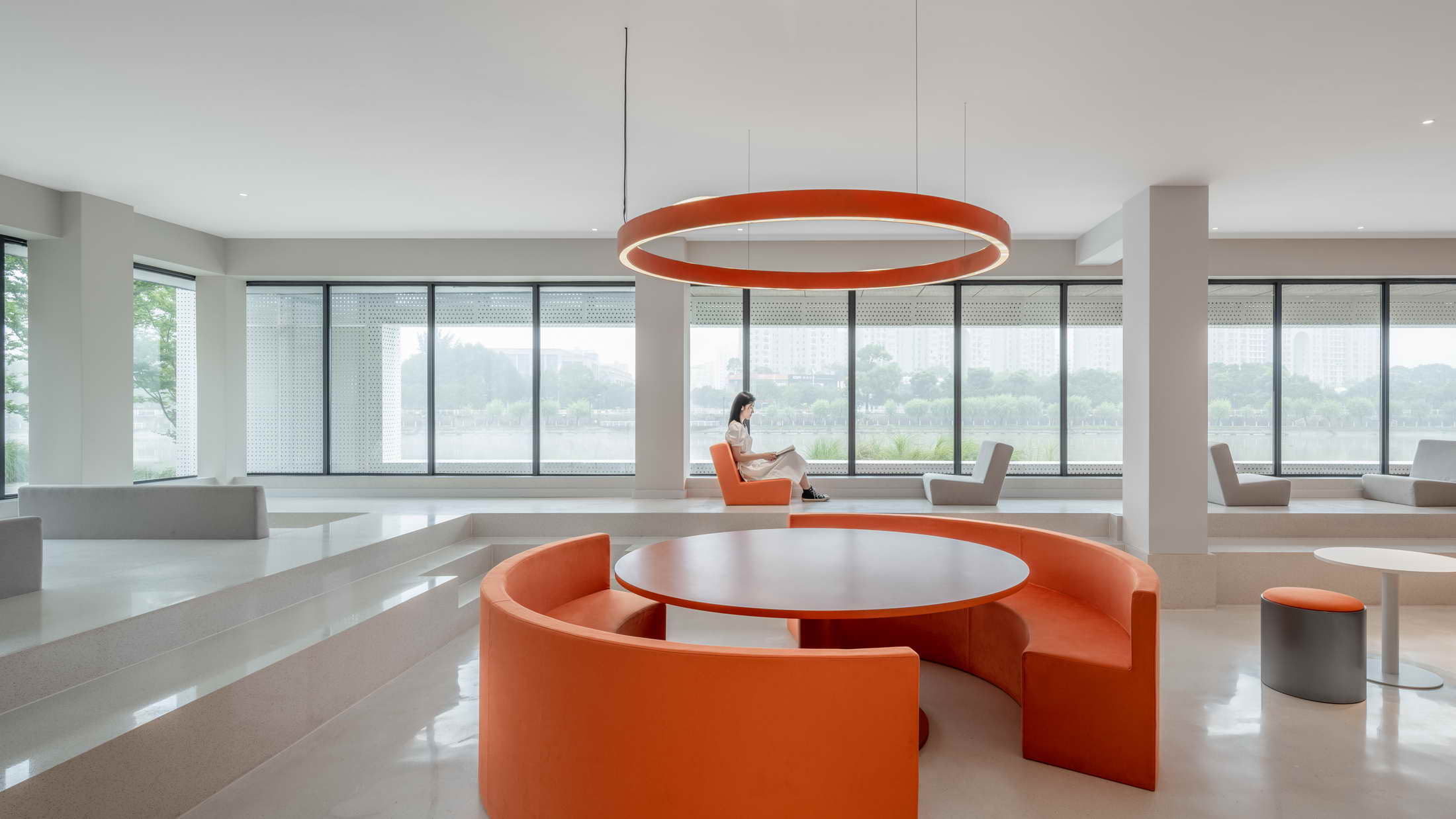
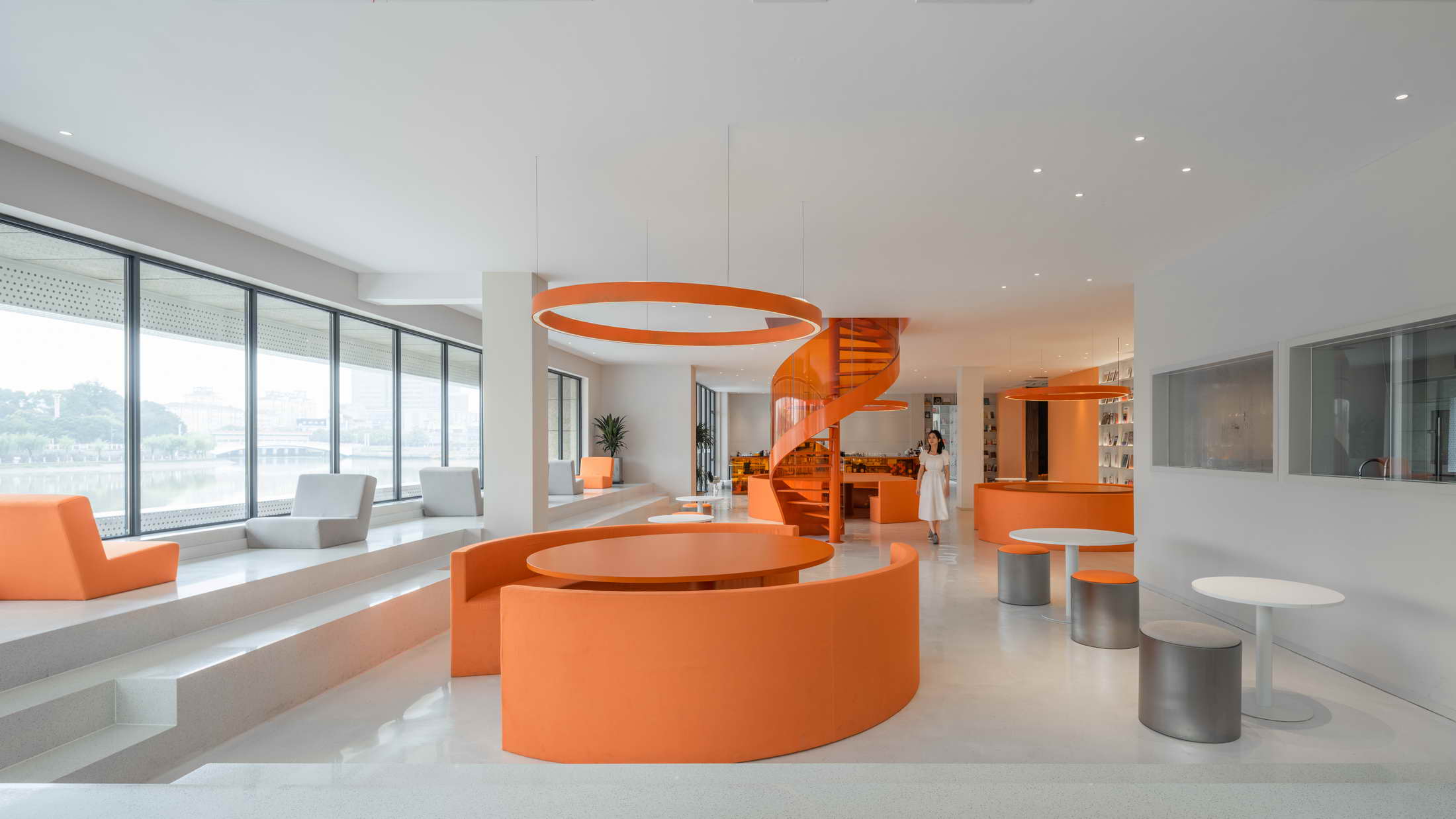

水面和天空
为增加迷宫的迷惑性,我用波纹铝板作为吊顶仿佛波光潋滟的永宁江水。同时把收银台区域的屋顶平台变成一个能够反射天空的镜面。我用把水面和天空浓缩在一层楼板的正反面上去创造一个失去方向和时间判断的场所。
Water surface and sky
To increase the confusion of the maze, I used corrugated aluminum panels as the ceiling to resemble the rippling water of the Yongning River. At the same time, the roof deck of the cashier area was turned into a mirror reflecting the sky. I condensed the water and sky on the front and back of the floor to create a place where direction and time are lost.
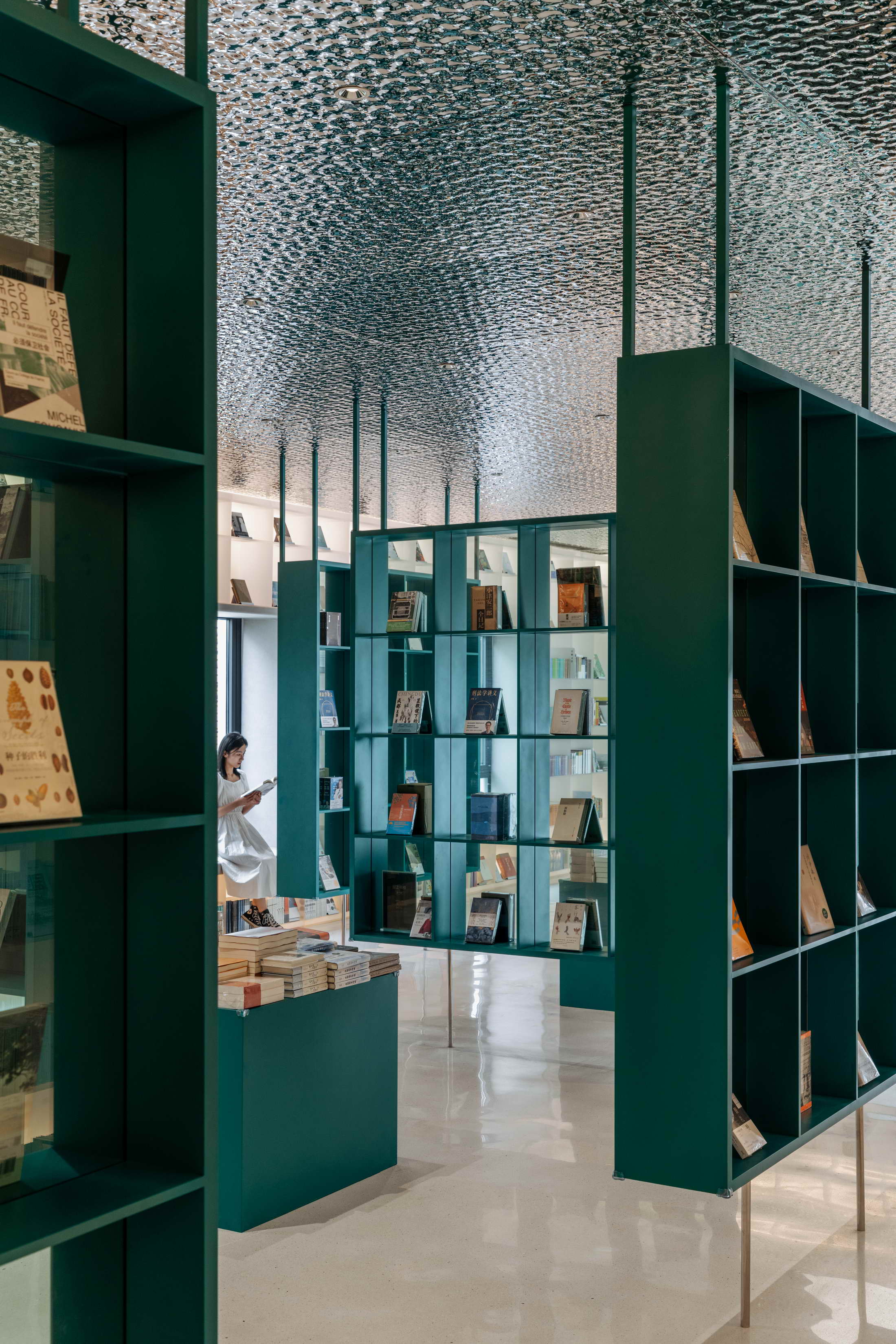
白云庭的神话
朵云书院黄岩店的庭院体现了我追究园林形式背后的精神的一种尝试。在业主的授权下,我有完全的意志成为这个庭院的主人去主观地设计。我决定因地制宜地去创造一个合乎自己观念的世界(园林)。我剔除了原来场地上的构筑物和设施。保留了原来的乔木植物,也保留了但改建了规范要求的消防楼梯间和排烟庭院。我把庭院看成水面,三组树木形成的绿岛就形成了中国园林中的基本范式一池三山。
The Myth of the White Cloud Garden
The courtyard of the Huangyan branch of Duoyun Shuyuan embodies an attempt to pursue the spirit behind the form of the garden. With the authorization of the owner, I had full will to be the owner of this courtyard to design it subjectively. I decided to create a world (garden) that fits my own concept of the site. I eliminated the structures and facilities on the original site. I kept the original trees and plants, and also kept but modified the fire stairwell and smoke extraction courtyard required by code. I viewed the courtyard as a water surface, and the three groups of trees forming a green island formed the basic paradigm of a pond and three hills in a Chinese garden.
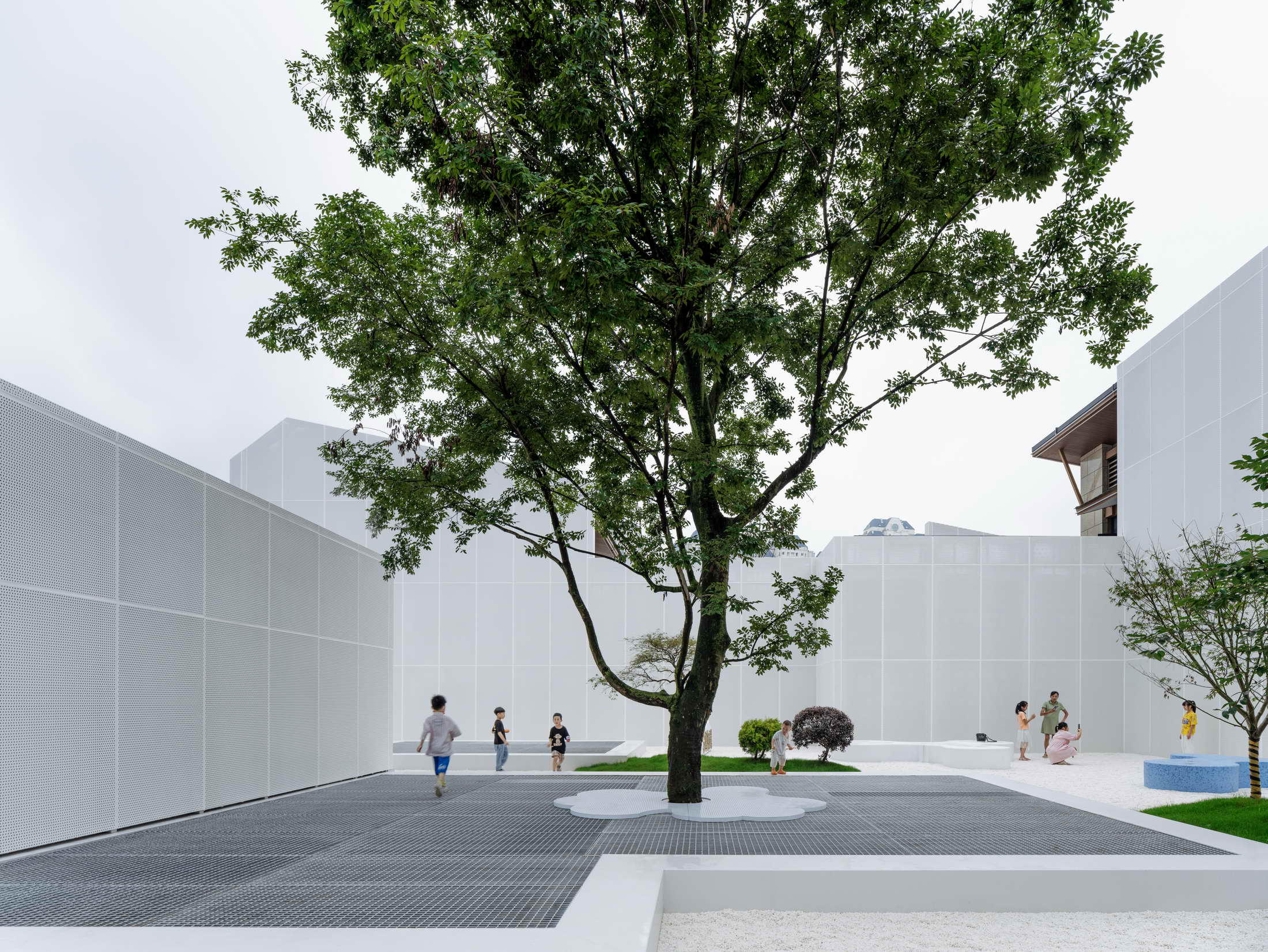
树形的搭配和组织是借鉴了我热爱的大画家倪瓒的构图。但庭院所表现的白石头和绿植很容易让人联系到日式的枯山水庭院。但这个灵感来自于仇英的《园林胜景图》中的一个关于中国枯山水的片段。画中一株勃勃生机的蔷薇花矗立在宽广的模仿波光粼粼的白色石作地面上,简洁疏阔。画中的庭院是竹帘围合而成,而我用白色穿孔铝板,一样封闭了一个半透明的庭院。光线可以经过围墙的筛漏而如雨点洒落庭院形成斑驳的光影而增加了庭院的生动。这个庭院不求传统园林的形式,而是传递出中国人热爱在人世间的最拥挤处创造一个生机勃勃人间仙境,即所谓桃花源。也是当代人的真实的梦境。
The matching and organization of the trees is borrowed from the composition of Ni Zan, the great painter I love. However, the white stones and greenery shown in the courtyard are easily associated with Japanese dry landscape gardens. But this inspiration comes from a fragment of Qiu Ying's "Garden Views" about Chinese dead landscapes. In the painting a vibrant rosebush stands on a wide mock sparkling white stone work ground, simple and sparse. The courtyard in the painting is enclosed by a bamboo curtain, while I have enclosed a translucent courtyard with white perforated aluminum panels, as well. The light can be sifted through the fence and sprinkle the courtyard like rain to form dappled light and shadows, adding vividness to the courtyard. The courtyard does not seek the form of a traditional garden, but conveys the Chinese love of creating a vibrant earthly wonderland in the most crowded place in the world, the so-called Peach Blossom Garden. It is also a real dream world for contemporary people.
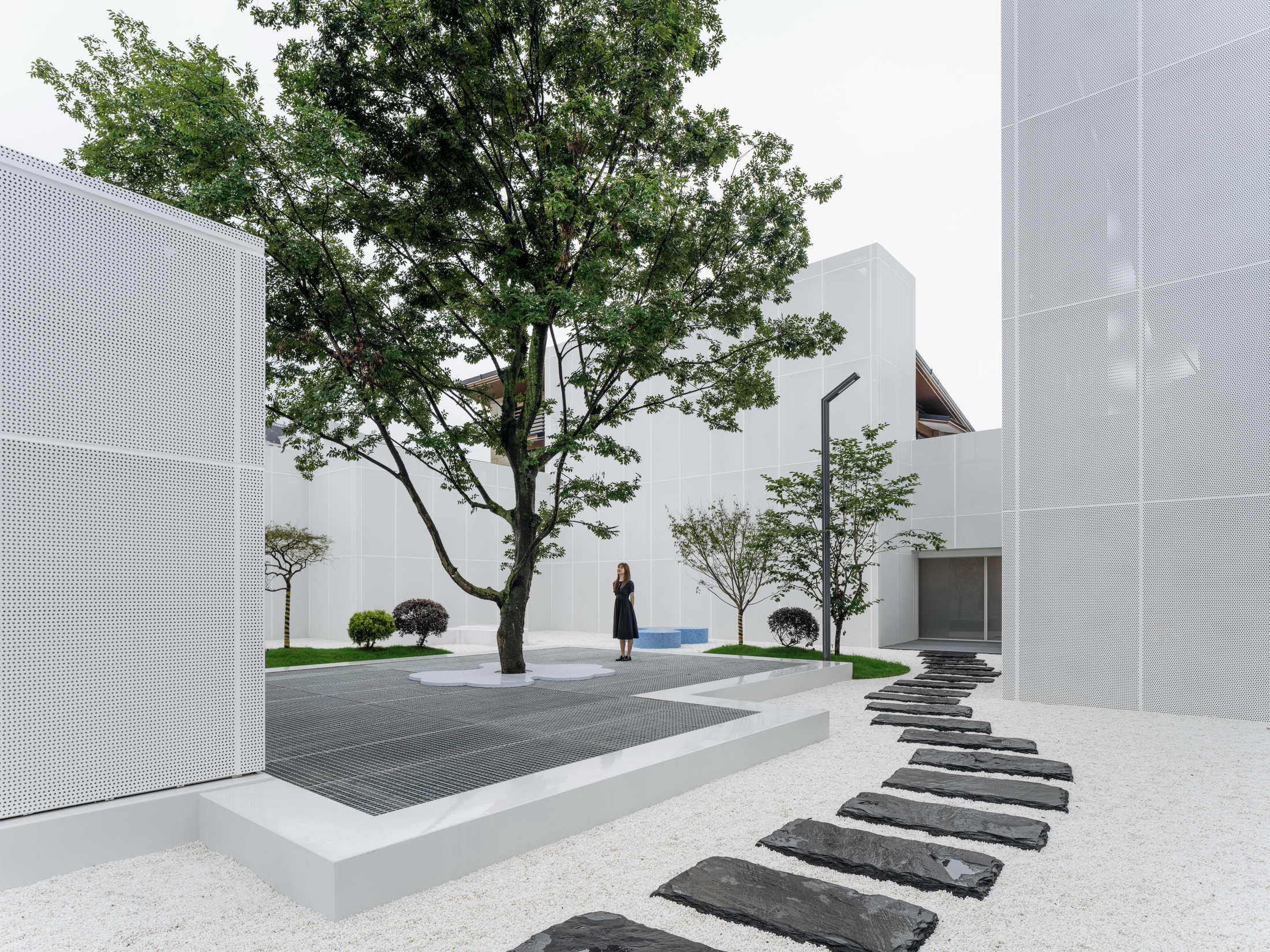
梦境和现实
白色铝墙并没有把所有的旧建筑遮挡掉。在白云庭的大多数地方,读者几乎完全陷在一个彻底的梦境。在有些地方,旧建筑会微微露出一些痕迹。这躲在梦境后面的真实反而构建了一个魔幻现实主义的体悟,不真实的真实,或者陌生的熟悉感。这大约才是我乐于所见的意外吧。
Dream and reality
The white aluminum walls do not hide all the old buildings from view. In most parts of White Cloud Court, the reader is almost completely trapped in a complete dream world. In some places, there are slight traces of the old buildings showing through. This reality behind the dream world instead builds a magical realism, an unreal reality, or an unfamiliar familiarity. This is about the accident that I am happy to see.


两个彩蛋
读者会在白云庭里发现一白一蓝两个云凳。这是用回收海洋垃圾的塑料制作的。利用黄岩是模具之都的优势,制作模具灌铸塑料成型。使用回收海洋垃圾的塑料来自我女儿的环保教育,建筑师需要在自己的设计中表达一种环保的态度。咖啡馆螺旋楼梯而上有个蓝色玻璃屋,日光下把橘色楼梯和屋顶交接处染成极其漂亮的紫色。不过只要按一个开关,蓝色玻璃就变成无色透明,永宁江就跃然眼前。这个玻璃是黄岩当地企业自主开发的车玻璃技术。我第一次拿来用在建筑上。我在演讲区也采用了这个玻璃。因为我一直幻想这个场景,在春天,我坐在阶梯上,蓝色褪去,盛放的樱花如云一般绽开在我脚下,这一切,真好。
Two colored eggs
Readers will find two cloud stools, one white and one blue, in the White Cloud Court. These are made of plastic from recycled marine garbage. Taking advantage of Huangyan being the capital of molds, molds were made to infuse and mold the plastic. The use of plastic from recycled marine garbage comes from my daughter's education on environmental protection and the need for architects to express an environmentally friendly attitude in their own designs. There is a blue glass house up the spiral staircase of the cafe, and the daylight tints the area where the orange staircase and the roof meet an extremely beautiful purple. But as soon as you press a switch, the blue glass becomes colorless and transparent, and the Yongning River leaps into view. This glass is a car glass technology developed by a local company in Huangyan. I brought it for the first time to use it in architecture. I also used this glass in the lecture area. Because I always fantasize this scene, in spring, I sit on the steps, the blue color fades, the blooming cherry blossoms bloom like clouds under my feet, it's all, so nice.
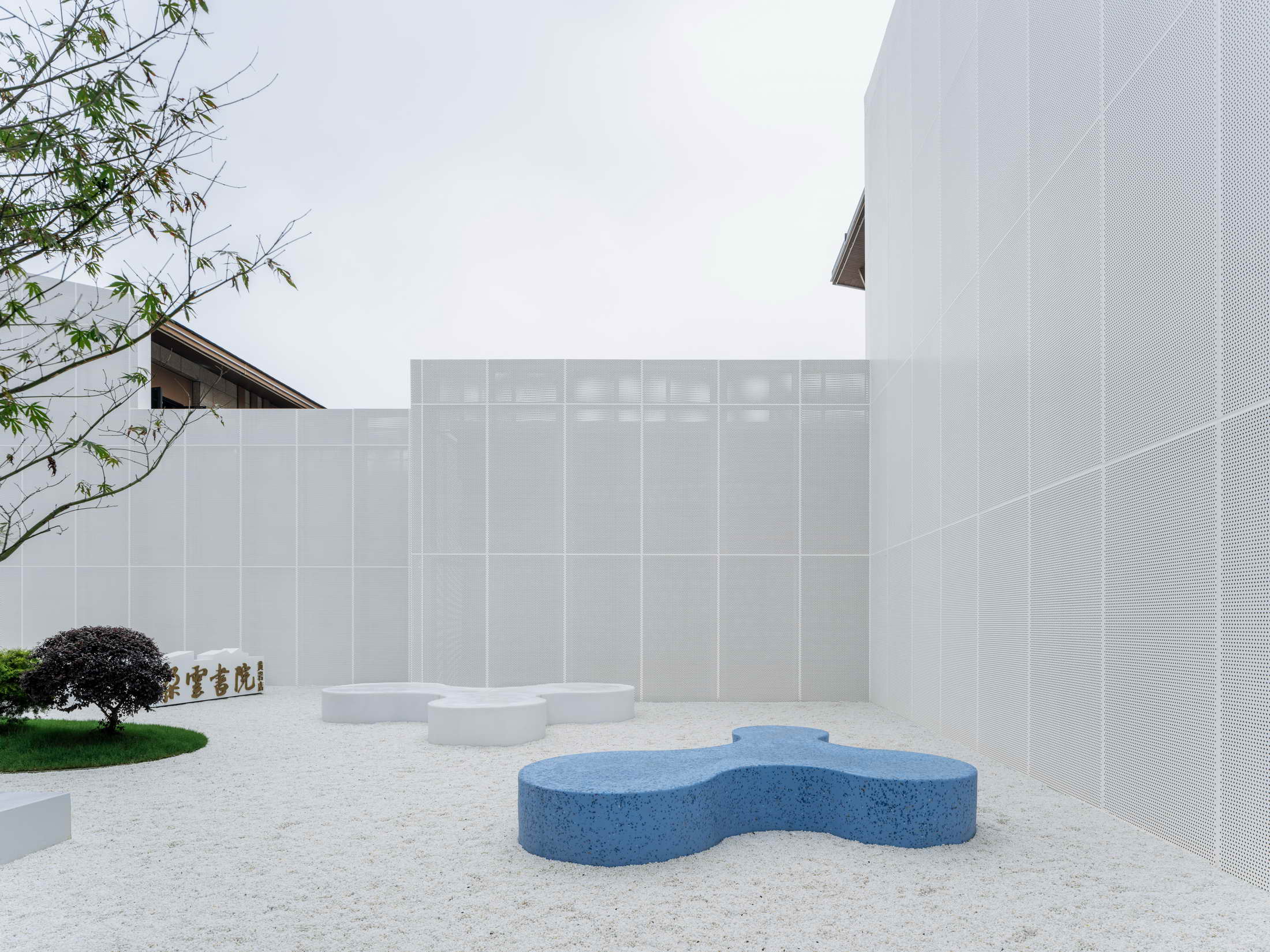
朵云书院黄岩店是小城市的新时代宣言
建筑即写作。我一直认为一间书店应该能够体现这个城市或者区域的精神。朵云书院黄岩店是我对黄岩这个城市以及城市生活的人和城市文化做出的理解和反应。我认为中国的小城市缺少一个塑造它们自己精神的当下的艺术形式。在互联网时代,三四线城市的人民普遍具有一种自信和判断。建筑师在这里的创作其实不必目追求大城市和外国的时髦或者在所谓历史形式中固步自封。完全可以用抽象的艺术语言运用隐喻将当地的特点创作出体现当地当下的新的艺术形式和空间。朵云书院黄岩店就是这么一个作品。如果中国的小城市都像黄岩那样满足和安详,有历史,风景,同时又着眼于创造属于自己的未来,那么则这样的中国就会更美丽。
Architecture is writing. I have always believed that a bookstore should reflect the spirit of the city or region. Duoyun Bookstore Huangyan is my understanding of and response to the city of Huangyan, the people who live there and the culture of the city. I believe that small cities in China lack a contemporary art form that shapes their own spirit. In the age of the internet, people in third and fourth tier cities generally have a sense of confidence and judgment. Architects do not have to pursue the fashion of big cities and foreign countries or be stuck in so-called historical forms in their work here. It is entirely possible to use abstract art language and metaphors to create new art forms and spaces that reflect the local present. One such work is the Huangyan store of Duoyun Academy. If all small cities in China were as content and peaceful as Huangyan, with its history and scenery, and at the same time focused on creating its own future, then China would be a more beautiful place.

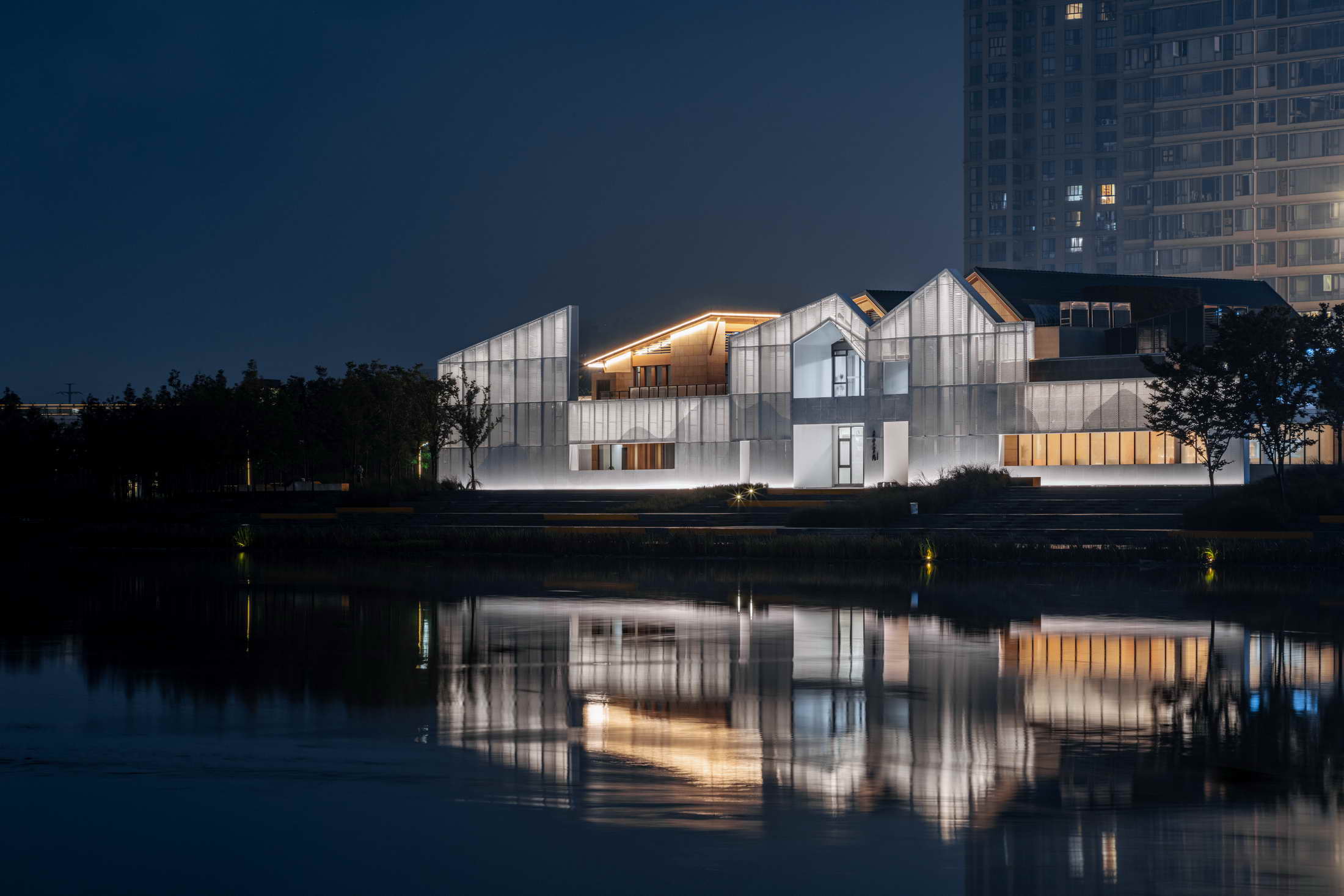
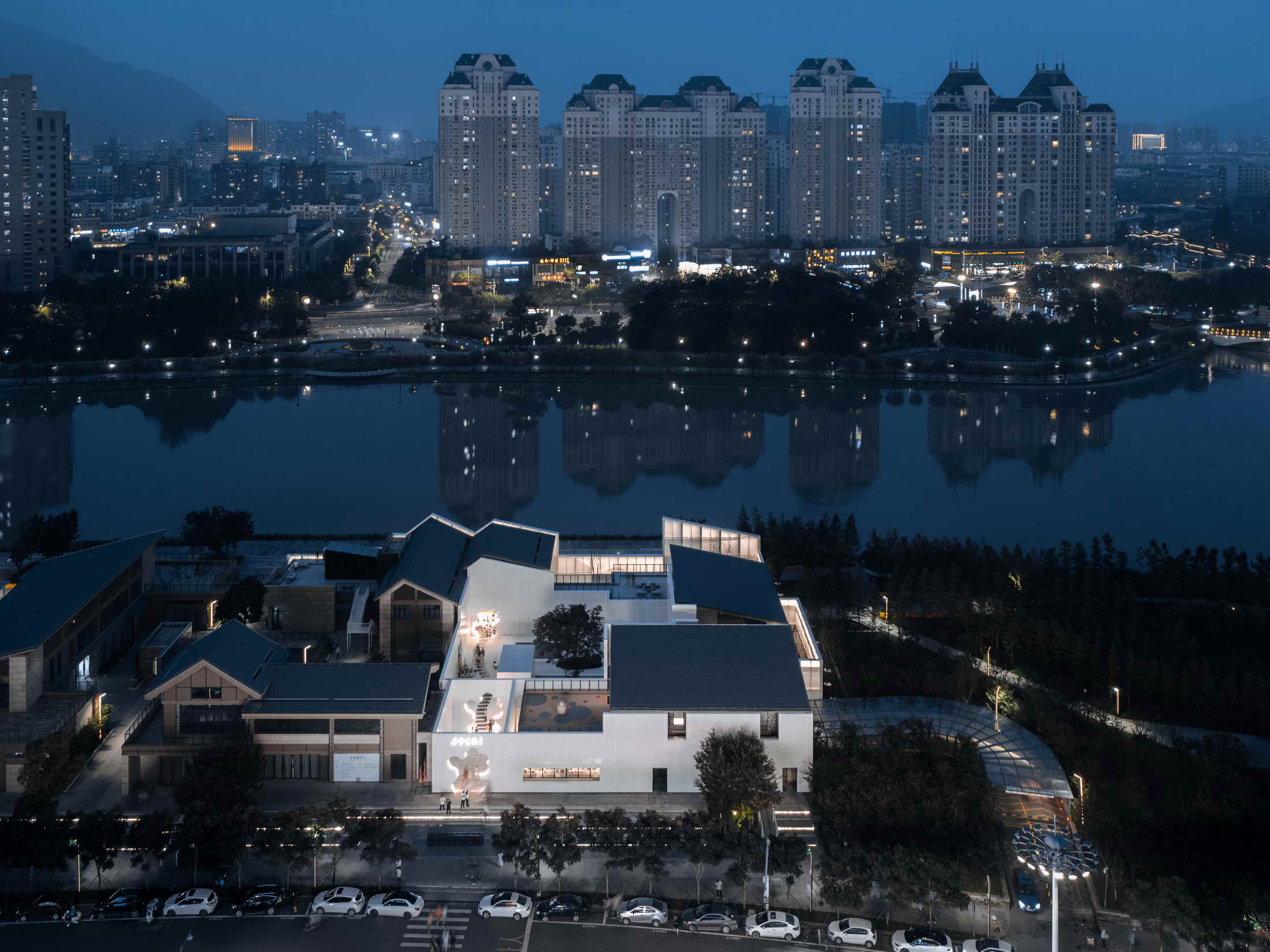
项目名称:朵云书院黄岩店
设计方:Wutopia Lab
联系邮箱:project1@wutopia.work
主持建筑师:俞挺
项目经理:濮圣睿
前期项目建筑师: 王卓尔
后期项目建筑师: 濮圣睿
设计团队:Begoña Masia, 宋君竹,吴亚萍,王家钧,王磊,戴云峰,张敏敏、郭佳女、吴晓艳、常学恩、陆烨、张问遂、孟东、荆亚伟
项目建筑师助理,驻场建筑师:米柯洁
建成时间:2021年6月
项目地址:浙江,台州
建筑面积:1726㎡
设计咨询:〇筑设计| Office ZHU
照明顾问:张宸露,蔡明洁
施工图设计:上海呈煜空间设计有限公司,上海至烨建筑设计咨询有限公司
施工团队:台州市黄岩市政园林建设发展有限公司,星威国际家居股份有限公司,张家港钰嘉金属装饰有限公司
摄影版权:CreatAR Images
视频版权:CreatAR Images
采访视频版权:Wuto-lini studio
业主: 台州市黄岩永云文化发展有限责任公司,上海世纪朵云文化发展有限公司
主要用材:涂料、亚克力、穿孔铝板、烤漆铝板、花岗岩、钢格网、砾石、微水泥
Project Name: Books in Clouds
Design Firm: Wutopia Lab
Contact Email: project1@wutopia.work
Chief Architect: Yu Ting
Design Manager: Pu Shengrui
Pre-project architect: Wang Zhuoer
Post project architect: Pu Shengrui
Design Team: Begoña Masia, Song Junzhu, Wu Yaping, Wang Jiajun, Wang Lei, Dai Yunfeng, Zhang Minmin, Guo Jianv, Wu Xiaoyan, Chang Xue’en, Lu Ye, Zhang Wensui, Meng Dong, Jing Yawei
Project Architect Assistant, Architect in Residence: Mi Kejie
Project Time: 2021.6
Location: Taizhou, Zhejiang
Building Area: 1726㎡
Design Consultation: Office ZHU
Lighting Consultant: Chloe Zhang, Cai Mingjie
Construction Plan Deepening team: Shanghai c-yuspace Design Co., Ltd, Shanghai Zhiye Architectural Design Consulting Co., Ltd.
Construction team: Taizhou Huangyan Municipal Garden Construction Development Co., Ltd. , Xingwei International Home Furnishing Co., Ltd., Zhangjiagang Yujia Metal Decoration Co., Ltd.
Photography: CreatAR Images
Video: CreatAR Images